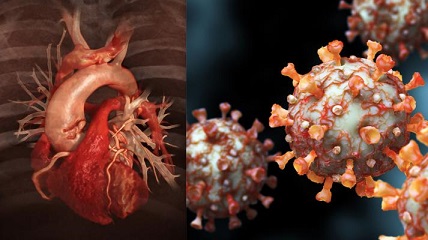BREAKING! University Of Queensland Study Discovers That SARS-CoV-2 Actually Attacks The DNA of Heart Cells!
Source: Medical News - SARS-CoV-2 -Heart Failure Sep 30, 2022 3 years, 3 months, 3 weeks, 6 days, 2 hours, 43 minutes ago
A new study led by researchers from University of Queensland, Brisbane-Australia has found that unlike the influenza virus that only causes inflammation of the heart cells and tissues, the SARS-CoV-2 coronavirus goes even much further in that it also attacks the DNA of various heart cells!

This new discovery adds to many reasons as to why we are witnessing a high number of deaths in COVID-19 infected individuals or post-COVID individuals related to heart failure.
The study also involved scientists and researchers from the Walter and Eliza Hall Institute of Medical Research, Victoria- Australia, University of Melbourne-Australia, The Prince Charles Hospital, Queensland-Australia, The Princess Alexandra Hospital, Queensland-Australia, Pontifical Catholic University of Parana-Brazil, University of Technology, Brisbane-Australia, Nanostring Technologies, Inc, Seattle-USA and the University of Manitoba-Canada.
The SARS-CoV-2 coronavirus is known to present with pulmonary and extra-pulmonary organ complications.
Interestingly, in comparison with the 2009 pandemic (pH1N1), SARS-CoV-2 infection is likely to lead to more severe disease, with multi-organ effects, including cardiovascular disease.
SARS-CoV-2 infections have been associated with acute and long-term cardiovascular disease, but the molecular changes that govern this remain unknown.
The study team investigated the host transcriptome landscape of cardiac tissues collected at rapid autopsy from seven SARS-CoV-2, two pH1N1, and six control patients using targeted spatial transcriptomics approaches.
Though SARS-CoV-2 was not detected in cardiac tissue, host transcriptomics showed upregulation of genes associated with DNA damage and repair, heat shock, and M1-like macrophage infiltration in the cardiac tissues of COVID-19 patients.
The DNA damage present in the SARS-CoV-2 patient samples, were further confirmed by γ-H2Ax immunohistochemistry.
In comparison, pH1N1 showed upregulation of interferon-stimulated genes, in particular interferon and complement pathways, when compared with COVID-19 patients.
The study findings demonstrate the emergence of distinct transcriptomic profiles in cardiac tissues of SARS-CoV-2 and pH1N1 influenza infection supporting the need for a greater understanding of the effects on extra-pulmonary organs, including the cardiovascular system of COVID-19 patients, to delineate the immunopathobiology of SARS-CoV-2 infection, and long-term impact on health.
The study findings were published in the peer reviewed journal: Immunology.
https://onlinelibrary.wiley.com/doi/10.1111/imm.13577
This is the first direct research on the hearts of COVID-19 patients who have died from the disease that has revealed the DNA damage of the heart cells by the SARS-CoV-2 virus.
The study also shows the differences of that from influenza infections and their effects on the human body.
The study finding gives researchers clues about exactly how severe COVID-19 is affecting the body, and also a potential way to detect who will be seriously affected by the disease in the future.
The study was led by Dr Arutha Kulasinghe from the University of Queensland&
amp;rsquo;s Diamantina Institute and Dr Ning Liu from Victoria’s Walter and Eliza Hall Institute of Medical Research.
Dr Kulasinghe said the research is only a preliminary step because the sample size was so small ie the hearts of just seven COVID-19 patients from Brazil were studied for the paper, along with hearts from individuals who had died from influenza and a control group.
However, the study findings were a major breakthrough in giving the scientific community insights for the first time as to why the heart was being affected by COVID-19 but not but severe influenza.
Dr Kulasinghe told Thailand
Medical News, “Our study came across a lot of DNA damage that was unique to the COVID-19 patients which wasn’t present in the flu patients. The study findings clearly shows that COVID-19 and flu have different ways of affecting the human host’s heart.”
The occurrences that SARS-CoV-2 affects people’s hearts has been observed both anecdotally and in a number of studies since the start of the pandemic, but the underlying cause is still yet to be determined.
Dr Kulasinghe explained, “One reason is that it is extremely difficult to get tissue samples from a living heart, so researchers have to wait for people to die from the disease and for their heart to be able to be studied.”
The study team found that rather than extreme inflammation which they had expected to find, inflammation signals had been suppressed in the hearts of the COVID-19 patients, while markers for DNA damage and repair were much higher than in people who had died from the flu.
Dr Kulasinghe added, “So the indications here are that there’s DNA damage here, it’s not inflammation, there’s something else going on that we need to figure out.”
The study team said the way the DNA damage presented was similar to the way chronic diseases such as diabetes or even cancer presented, with the tissues of the heart putting out DNA damage signals.
The study team warned that dealing with the health implications of COVID-19 itself and of so-called Long Covid ie the cohort of individuals who suffer chronic complications from the disease, will be a challenge for countries in the months and years ahead.
The study team said they hoped their findings could be built upon to develop methods to establish who was at risk of serious complications from COVID-19, so they could be treated early.
Dr Kulasinghe commented, “Ideally in the future if you have cardiovascular disease, if you’re obese or have other complications, and you’ve got a signature in your blood that indicates you are at risk of severe disease, then we can risk-stratify patients when they are diagnosed.”
He continued, “Our challenge now is to draw a clinical finding from this, which we can’t at this stage, but it’s a really fundamental biological difference we’re observing between COVID-19 and flu which we need to validate with larger studies.”
For more on
SARS-CoV-2 and Heart Failures, keep on logging to Thailand
Medical News.
Read Also:
https://www.thailandmedical.news/news/breaking-long-covid-is-a-misnomer-the-conditions-are-being-caused-by-viral-persistence-and-viral-peptides-similar-to-retrotransposons-and-introns
